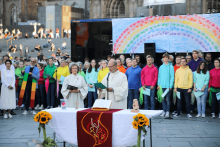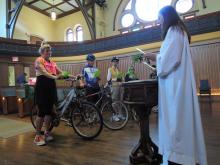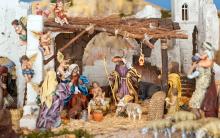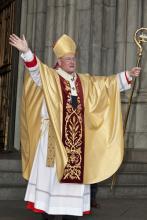blessing

Eight Catholic priests held a ceremony blessing same-sex couples in front of the Cologne Cathedral in western Germany on Wednesday evening, in protest against socially conservative Cardinal Rainer Maria Woelki, the archbishop of Cologne.

FOR 12 YEARS, the Hortons have spent their summers on the revival circuit, driving hundreds of miles from one small city to another. Samuel Horton, a Black Baptist preacher famous for his healing, is proud of the souls he has won for the Lord and prouder of the power he wields. Still, he yearns for miracles no one would question, that would wipe away any doubt in his ability. If only he could heal his younger daughter, Hannah, who has cerebral palsy. If only his wife could give him another son, especially after their second son, Isaiah, was stillborn. In his pride, Samuel blames the women around him for his own limitations, even as he relies on them to hold together the picture of faith he has carefully constructed.
Behind the scenes of Samuel’s performance is 15-year-old Miriam Horton, the narrator of Monica West’s Revival Season. When the novel opens, Miriam is in awe of her father’s position and power, despite questioning the limited roles women hold in her community. As she helps raise Hannah and supports her mother, she memorizes her father’s prayers and sermons, carefully stud-ying his process. She particularly envies her younger brother Caleb, who has the privilege of shadowing their father. Still, she prays that the scandal of the previous summer—when her father injured a pregnant girl he was meant to heal—does not follow them into the new season.

"We experience being known in many different ways: in baptism, whether as infants or children or adults, in confirmations, in ordinations, in weddings. We haven't had anything for people who have transitioned to change their name or ask that we use different pronouns for them. Yet this is obviously a really profound shift in who they understand themselves to be. It’s important for the church to affirm that identity, and name it as good."

Jim turned to me and said: “We’re greedy — seeking a second blessing.”
I smiled wryly: “This is my third.”

Jesus said, “Let the little children come to me, and do not stop them; for it is to such as these that the kingdom of heaven belongs.”
Pope Francis paraded through Washington D.C., on Sept. 23, and took Jesus’ words literally.
After Francis’ security detachment turned away a young girl who had gotten over the barricade fence to greet him, he quickly called her over for a blessing.

It was the sixth annual Blessing of the Bikes at the downtown church — a type of local event that has become more common as a growing number of churches consider the idea that protecting the environment is not just a scientific or political debate, but a spiritual one.
The movement has grown in the past decade and crosses denominations. An “Evangelical Climate Initiative” issued in 2006 has been signed by hundreds of religious leaders, and the Vatican held a one-day summit in late April to “elevate the debate on the moral dimensions of protecting the environment.” Pope Francis is preparing this summer to issue an encyclical — one of the most authoritative church documents — framing climate change action as a moral and religious imperative.

You don’t want God to ask you to be a prophet. You really don’t.
When God calls you to some holy task, you might expect a contemplative path, a quiet life of service, and love of neighbor. You might expect a comfortable life of piety and hopefulness, grace, and caring.
But true prophets know better.
Prophets tend not to have such idyllic hopes for God’s call. Prophets know too well that the call of God to speak hard truths is paved with difficulty. The prophet’s road is lonely not because she escapes the hubbub of everyday life in order to retreat and draw near to God. No, the prophet’s road is lonely because she is called to the most troubled corners of the world, places which existence we would rather deny or ignore. The prophet’s road is lonely because she must speak boldly to an upside-down world that doesn’t realize it is upside-down. The prophet sees the world as it really is while we see the prophet and marvel that she is walking on the ceiling.
In our readings for this week, we encounter two prophets who speak bold words to a world predisposed to ignore them. We encounter two prophets who speak a word of deliverance to the downtrodden and judgment upon the powerful. We encounter two prophets engaged with the most pressing matters of all. We encounter two prophets that we still refuse to heed.

Henri Nouwen was a priest who taught at Harvard, Yale, and Notre Dame. He also was a talented and popular writer. Over time, he became dissatisfied in his role as a professor. He got an unexpected invitation to become chaplain for a community of people with intellectual disabilities in Toronto. He accepted and soon had misgivings.
Henri quickly realized that the people under his care couldn’t care less about what he’d written or how much he‘d learned. They weren’t capable of reading and understanding his beautiful words.
Henri was going to have to change. He would have to start living those words in a deeper way. And that’s hard. (I know full well that it’s much easier to write about things in a flowing way than it is to let those words flow through me in how I live every day.)
He had an experience that drove home the point.
In his book Life of the Beloved, Henri tells of a woman named Janet who lived in the community and was having a difficult time. So she asked Henri for a blessing. He responded in a rote way, putting his thumb to her forehead to make a sign of the cross — something he’d done countless times in his role as a priest.
Janet would have none of it.
“No, that doesn’t work,” she protested. “I want a real blessing!”

Irresponsible. Foolish. Impulsive. Recent college graduates with substantial student loans are sometimes regarded in these terms. Those who attended college decades ago, with a $15 per credit hour, may assume that these graduates are spoiled Millennials who “should have known better” than to agree to the loan terms.
THE ANACOSTIA RIVER is a river of contrasts. Often called “the nation’s forgotten river,” it flows for eight-and-a-half miles through some of the richest and poorest communities in and around D.C., through residential and industrial zones, through marshes and military installations. In fact, the federal government owns so much land in the watershed that when all those federal toilets flush during a heavy rain, they drain directly into the river.
The Anacostia River watershed is home to more than 800,000 people, 43 species of fish, and nearly 200 species of birds—including our nation’s symbol, the bald eagle, and the majestic great blue heron. Yet the trash in the river is so deep and wide at times that you’re just as likely to see a heron walking across a flotilla of trash rather than flying over the water.
As the Anacostia Riverkeeper—part of the Waterkeeper Alliance movement to protect local waterways—it was my job for three years to be the eyes, ears, and voice of its watershed. Of the nearly 200 waterkeepers worldwide, I was the only riverkeeper who was also a minister. I was called “Rev. Riverkeeper.”
The antiquated sewer system that pumps more than 2 billion gallons of raw sewage, mixed with polluted runoff, into the river each year is not just a shame, it’s a sin. African-American churches along the Anacostia used to baptize their members in the river. Nowadays, the river wouldn’t wash away anyone’s sins. My goal as Rev. Riverkeeper was an Anacostia that was not only “fishable” and “swimmable”—as required by the Clean Water Act—but also “baptizable.”

Immigrants are a blessing, not a curse. They are assets, not deficits. I have learned this the hard way after seven years working with the New York City New Sanctuary Movement. We have accompanied 67 people on the verge of detention or deportation, and we have lost only three of them.
These people are restaurant owners — employers. Some run small high tech start-ups; others raise children on their own, grouping with other parents to take care of them. They live under the constant fear of disruption to their lives and constant trepidation about whether their children will be separated from them. Many have been picked up for small offenses, like traffic violations and gone to jail only to luckily be released. But they have still have shown resilient courage, that miracle of guts that keeps them going inside the constant fear and the constant harassment. Immigrants are spiritual and economic blessings, not curses. They are assets, not deficits.

I’m sure most of us have played the scene in our heads one too many times: little baby Jesus, presumably Caucasian, lying in a tiny crib-esque manger comfortably padded with hay — even though the song specifically says “no crib for a bed” — while the animals, which are perfectly behaved, quietly and reverently look on. Cue the wise men, in their strange, exotic garb, and sprinkle a few angels in there — you know, the ones that look like babies with wings and white togas.
That was my impression of the nativity scene as a kid, and the popular children’s Christmas carol, “Away in a Manger” didn’t do anything to help. It seemed to perpetuate the picturesque nativity image of most of the figurine depictions in our living rooms.
But, if only for a few minutes, put aside the notions that the “manger” probably wasn’t as clean and cozy as we thought, that it probably wasn’t a silent night — have you met a baby that’s gone through its first 24 hours without crying? — or that Jesus probably wasn’t snug in a crib conveniently left in a manger.
Even though the song may seem like it only deserves a cursory glance, as it was originally published in theLittle Children's Book for Schools and Families in 1885, I purport there’s something more to the childhood classic.
What do you have to say about "living abundantly"? How do you deal with anxiety when you think about the future of churches?
“Very truly, I tell you, anyone who does not enter the sheepfold by the gate but climbs in by another way is a thief and a bandit. The one who enters by the gate is the shepherd of the sheep. The gatekeeper opens the gate for him, and the sheep hear his voice. He calls his own sheep by name and leads them out. When he has brought out all his own, he goes ahead of them, and the sheep follow him because they know his voice. They will not follow a stranger, but they will run from him because they do not know the voice of strangers.” Jesus used this figure of speech with them, but they did not understand what he was saying to them. So again Jesus said to them, “Very truly, I tell you, I am the gate for the sheep. All who came before me are thieves and bandits; but the sheep did not listen to them. I am the gate. Whoever enters by me will be saved, and will come in and go out and find pasture. The thief comes only to steal and kill and destroy. I came that they may have life, and have it abundantly.
~ John 10:6-10

New York Cardinal Timothy Dolan, president of the U.S. Conference of Catholic Bishops, delivered his highly-anticipated benediction Thursday night to close out the Republican National Convention in Tampa.
Dolan will do the same for the Democrats next week in Charlotte, so this blessing seemed less like an imprimatur for the GOP than it would have had President Obama not taken the cardinal up on his offer to give the closing prayer after he accepts his party’s nomination.
Moreover, Cardinal Dolan’s four-minute prayer clearly had something for everyone – or, rather, something to cheer and challenge everyone in the hall.
He mentioned the importance of protecting the unborn, but also welcoming immigrants. His riff on religious freedom was a swipe at the birth control mandate, but he also mentioned the importance of “solidarity” and the “common good,” two bedrock principles of Catholic social teaching that the Republican platform – and especially Paul Ryan’s budget plans – are seen as undermining.
My eyes locked with those of the priest just as his right hand, gripping the aspergillum, went back (in a wind-up that would impress many baseball enthusiasts) and then forward, sending a shower of water across my face and torso.
While I wiped water from the bridge of my nose, we both laughed and I could see the jolly Irish priest’s arm go back once again as he prepared to douse the people seated in the pew behind mine.
So began the annual Blessing of the Artists in Laguna Beach, the sleepy seaside village where I live in southern California. Blessing the artists is a community tradition that goes back almost 15 years, begun at the behest of the artists themselves. The ritual is held the first week in June, in advance of the opening of the Sawdust Festival and the Festival of the Arts, art exhibitions held here each summer and populated largely by artists and artisans from the town itself.

I’m coming to terms with the realization that I’m a big, fat fake. But at least I’m in good company.
Amy’s birthday was last Sunday. We had just arrived in Portland, so we went to a fancy-pants restaurant, situated several hundred feet above the skyline, with a view of the entire surrounding city, the Willamette River and Mount Hood. We shared a bottle of wine, enjoyed outstanding service and indulged on gourmet food to celebrate her ever-growing tenure as an occupant of our planet.
The bill for the night was nearly enough to cover groceries for our family for up to two weeks.
We could manage it; we knew it was pricey before we got there. And it was fairly easy to justify too. We were making memories. It was an other step in the courtship, helping us fall in love with our new city. We had worked hard over the past eight years, establishing a church in Colorado, struggling to pay bills at times, and we’re now enjoying some material fruits of our labor.
What bullshit.
Seriously, how does anyone really justify spending that kind of money on one meal? After all, from our vantage point on the 30th floor, I could see scads of people below, standing on street corners, tucked in under sleeping bags and beneath cardboard boxes, walking wearily from one job to the next, hoping to pull together enough to make rent.

With Mother’s Day just around the corner, I’ve been thinking about the matriarchal blessing—the moment when an old woman, staring death in the eye, communicates to a younger female relative or friend that life is good and love is eternal.
As far as I know, the only mention in the Bible of an older woman blessing a younger woman is when Elizabeth says to her young, unwed, pregnant relative Mary: “Blessed are you among women, and blessed is the fruit of your womb” (Luke 1:42). Elizabeth probably wasn’t the matriarch of her family, and she wasn’t about to die, but her Spirit-inspired words were still similar to a matriarchal blessing. She welcomed the new life growing in Mary, and her loving hospitality surely must have given courage to the baffled young mother-to-be.


Mother’s Day and today is a celebration of the role of my maternal life, a role that has proved to be more satisfying and blessed, which is closer to my heart, than writing or art or friendship or even marriage. The work and longing of a life-time, almost, has been invested in my children — the beings who had their start like seeds in my own body, who have bloomed and flourished, who overcame barriers and difficulties caused by my own parental inexperience or ignorance, who grew as I grew, who now have lives of significance, who are learning along with their own offspring, much as I did but in a far more swiftly changing world.
So there were pleasurable moments as I heard from all five individually. And flowers — yellow daisies and Queen Anne’s lace from Robin, my eldest. (It’s a favorite flower for us both. She and I remember back to her wedding to Mark, on an island in an Illinois forest preserve, when her wedding bouquet was made of those white lacy flowerets, exploding like fireworks.) I hope to use those delicate flowers as objects to write about when I talk about poetry at an elementary school next week.


To bless someone, in the most literal sense of the word, is to confer your hopes to them.
That's why so many traditional blessings begin with the word "may."
Take, for instance, what is perhaps the best-known Irish blessing (or toast, as the case may be this time of the year):
May the road rise up to meet you.
May the wind be always at your back.
May the sun shine warm upon your face;
The rains fall soft upon your fields and until we meet again,
May God hold you in the palm of His hand.
"May" doesn't mean "so be it." May implies that something is possible, but not a done deal. May hopes that God puts it in play and that you get out of your own way and allow it to happen.
John O'Donohue, the great contemporary Irish poet/philosopher (and former Catholic priest), knew the power of "may."
I love the lights and the love, which somehow seems a little easier during this season. Most of all I love the message: God made flesh, becoming human, and dwelling among us.
Our giving and receiving of gifts is most of all a reminder of the good gifts that God has already given to us. There is an old Sunday School saying that goes, "You can’t out give God."
No matter how much we give to those around us, it can never match the Light of the World entering into the darkness to be with us. Emmanuel, God with us, is the gift that can’t be out given.
In all the hustle and bustle of Christmas, don’t forget that. And don’t forget the people that you are especially thankful for.